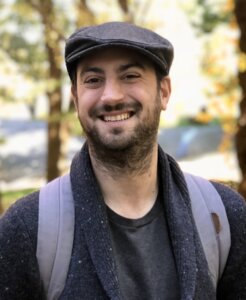At Washington University, 2 Jewish seniors differ on Israel, but share a sense of loss
Neither fit neatly on either side of the campus conflict. Both left Wash. U spaces where they once felt at home
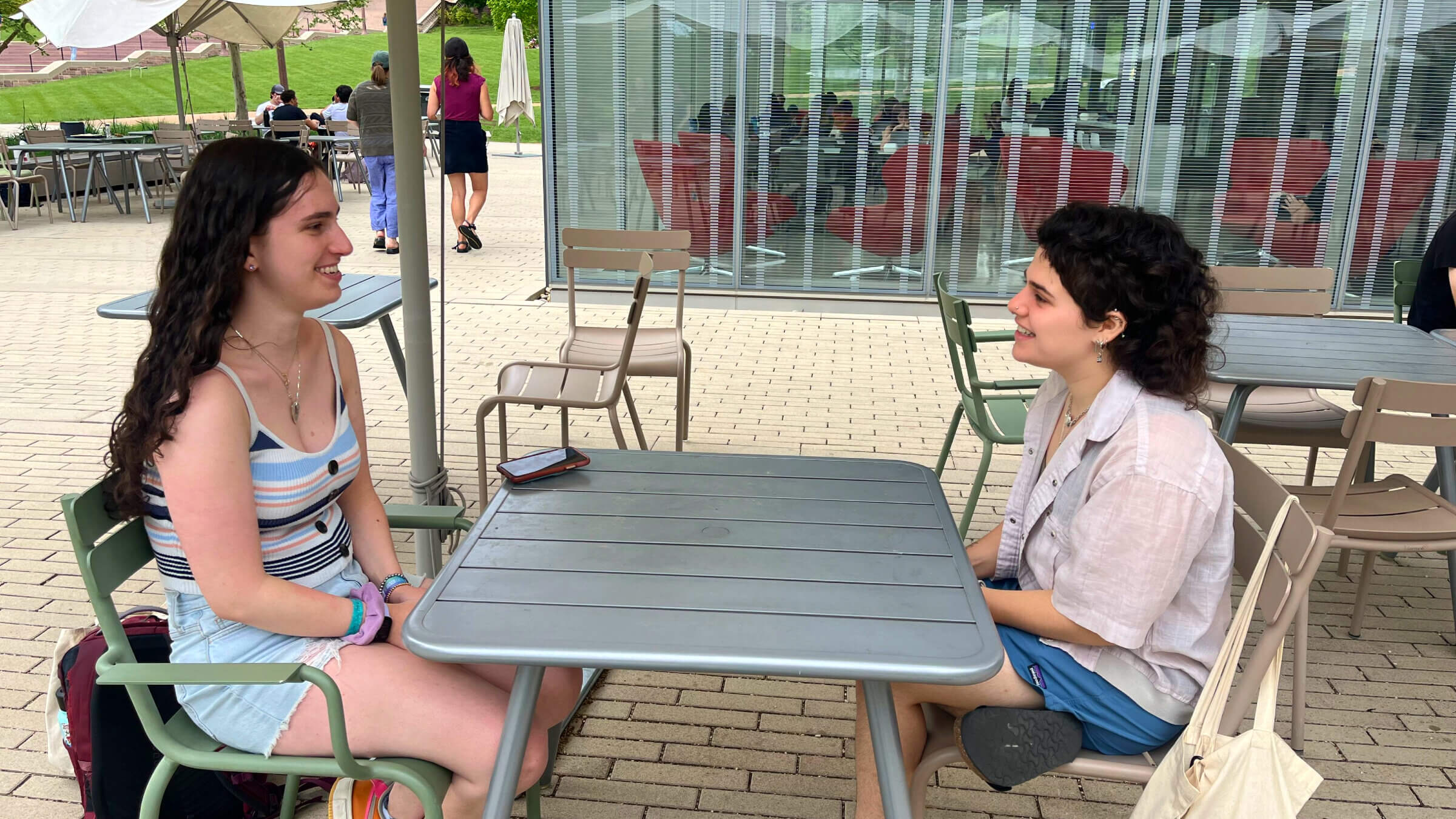
Photo by Andrew Silverstein
Both young Jewish women graduated from Jewish day school, attended Jewish summer camps and wear Star of David necklaces. Both believe Israelis and Palestinians have a right to self-determination. Both are about to graduate from Washington University in St. Louis.
But they are headed in opposite directions during the most contentious year on campus — one finding a home in Hillel and one deciding that she did not have a place there anymore.
I met Emma Platt and Lila Steinbach on a recent visit to Wash U., as it is known, to find out what this past year was like for Jewish students at a college where they represent nearly a quarter of enrollments. I expected to hear a variety of experiences. But what I didn’t expect was that two Jews, with such similar backgrounds and a shared convictions, would land in such different places at Wash U.
The changes they saw at their prestigious university disquieted them both. The friendly campus they knew in their early college careers had heartbreakingly disappeared. Thousands of other Jewish college students can relate. Since Oct. 7, the shock of Hamas’ attack, Israel’s military campaign in Gaza, protests, encampments and arrests have polarized campuses, and placed particular pressure on Jewish students to take a stand and choose a side.
For many, that pressure goes to the heart of their Jewish identities.
I talked to Platt one recent morning, and Steinbach that afternoon. But I also wanted to find out what they had to say in each others’ company. They agreed to meet up the next day on the east end of Wash U.’s campus, where days before a pro-Palestinian encampment had stood.
I found out how, though neither fit neatly on either side of the campus conflict, Platt took on the label of “pro-Israel” and Steinbach of “pro-Palestine” — seemingly opposing and immutable positions that shrunk their social circles, and walled them off from parts of college life in which they had once taken part.
Emma Platt
Platt was studying for finals in the library when she heard chants of “Globalize the Intifada.” Student and outside community groups were setting up a divestment encampment.
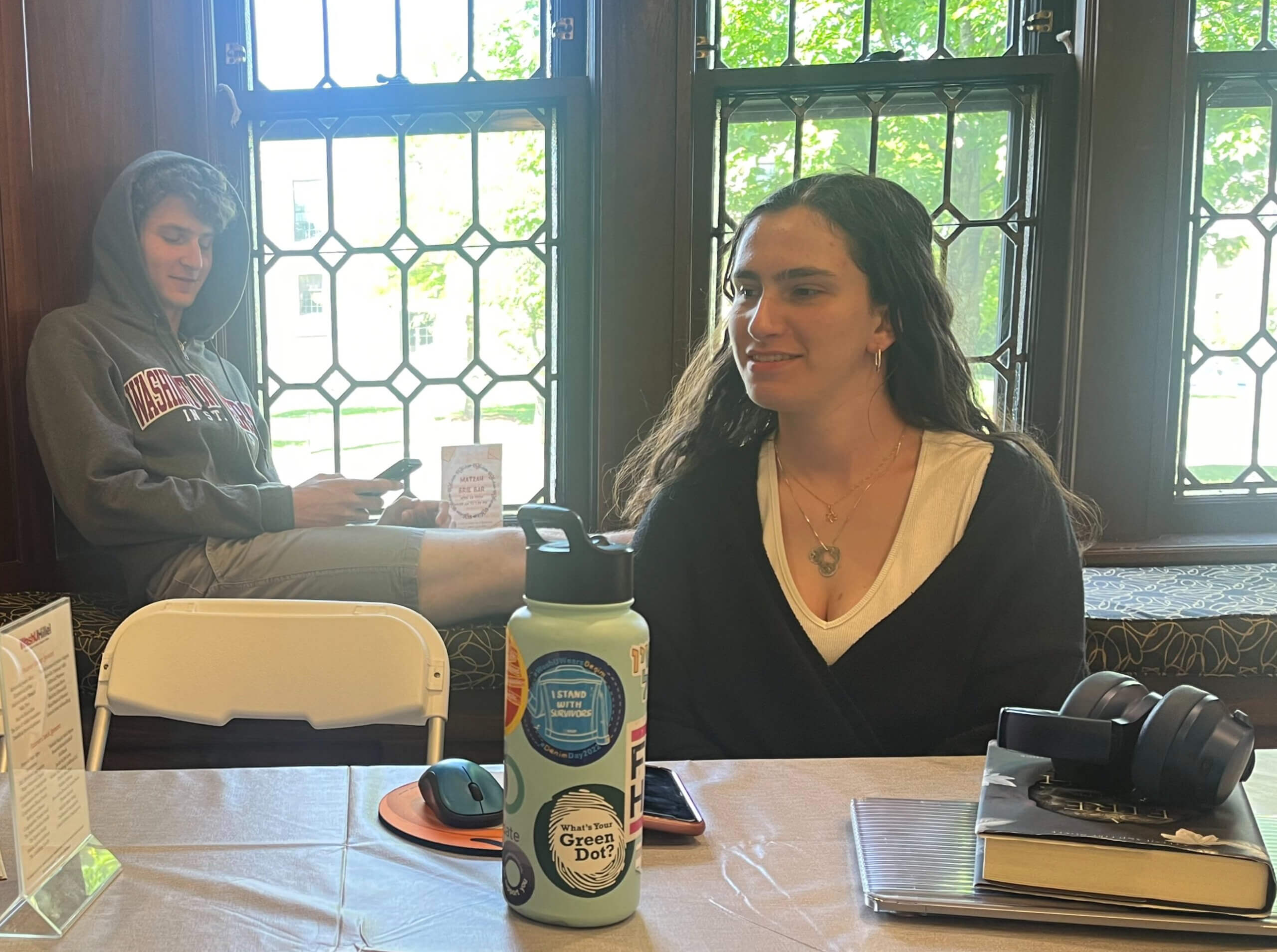
In a panic, she and another Jewish student left through a back door to avoid the protesters and headed directly to the Hillel, the university’s chapter of the largest campus Jewish organization in the nation. To her ears, the chants incited violence against Jews, and hit her personally.
“I can’t describe what it feels like to see people that I used to be best friends with leading chants of ‘Globalize the Intifada,’” she said three days later in a discussion with other Jewish students and Hillel staff at the Hillel Center, which had an armed guard outside. Since the fall, it’s become a comfortable Jewish space for her.
Platt, a 22-year-old women, gender and sexuality studies major, grew up outside Baltimore, attending not only Jewish day school but Jewish summer camps, and also participated in B’nai B’rith Youth Organization and the HaZamir Jewish youth choir. But before this school year, she was not involved in Jewish campus life. Instead, she formed a community with friends from student government, her classes, and advocacy groups for gender-based violence victims.
She had avoided discussing Israel, knowing her opinion clashed with other progressive-minded students. But after Oct. 7, she said she was pushed out of campus groups for being a Zionist, and has lost close friends.
“I held on as long as I could in the social justice spaces,” she said.
A group that hosts discussions of race and power told her she wasn’t anti-racist if she was Zionist. A sexual violence victims support group pushed her out when she resisted a group statement that questioned the founding of Israel. “What frustrates me is that I can’t just say, ‘I support Israel.’ It has to come with a qualifier of like, ‘I don’t support everything that the IDF does. Everything the Israeli government does.’”
Platt said because she had grown up in a strong Jewish community, she intentionally in college sought out friends who had grown up in very different circumstances.
But when her new communities rejected her defending Israel, she said, she sought out Jewish campus groups — Hillel, but also Chabad, the Hasidic movement which also has a robust presence on college campuses, and a reputation for welcoming even minimally observant Jews.
She is one of many Jewish students who have become more engaged in Jewish campus groups like Hillel and Chabad, at Wash U., and nationally. Washington University Chabad Rabbi Hershey Novack attested to the trend.
“Some of them seek our programs as a beacon of stability,” he said.
Lila Steinbach
Steinbach used to be a part of that organized Jewish community at Wash U.
“I would go to holiday services at Chabad. I would go to the Shabbat dinners,” she said. “I would pray at Hillel.”
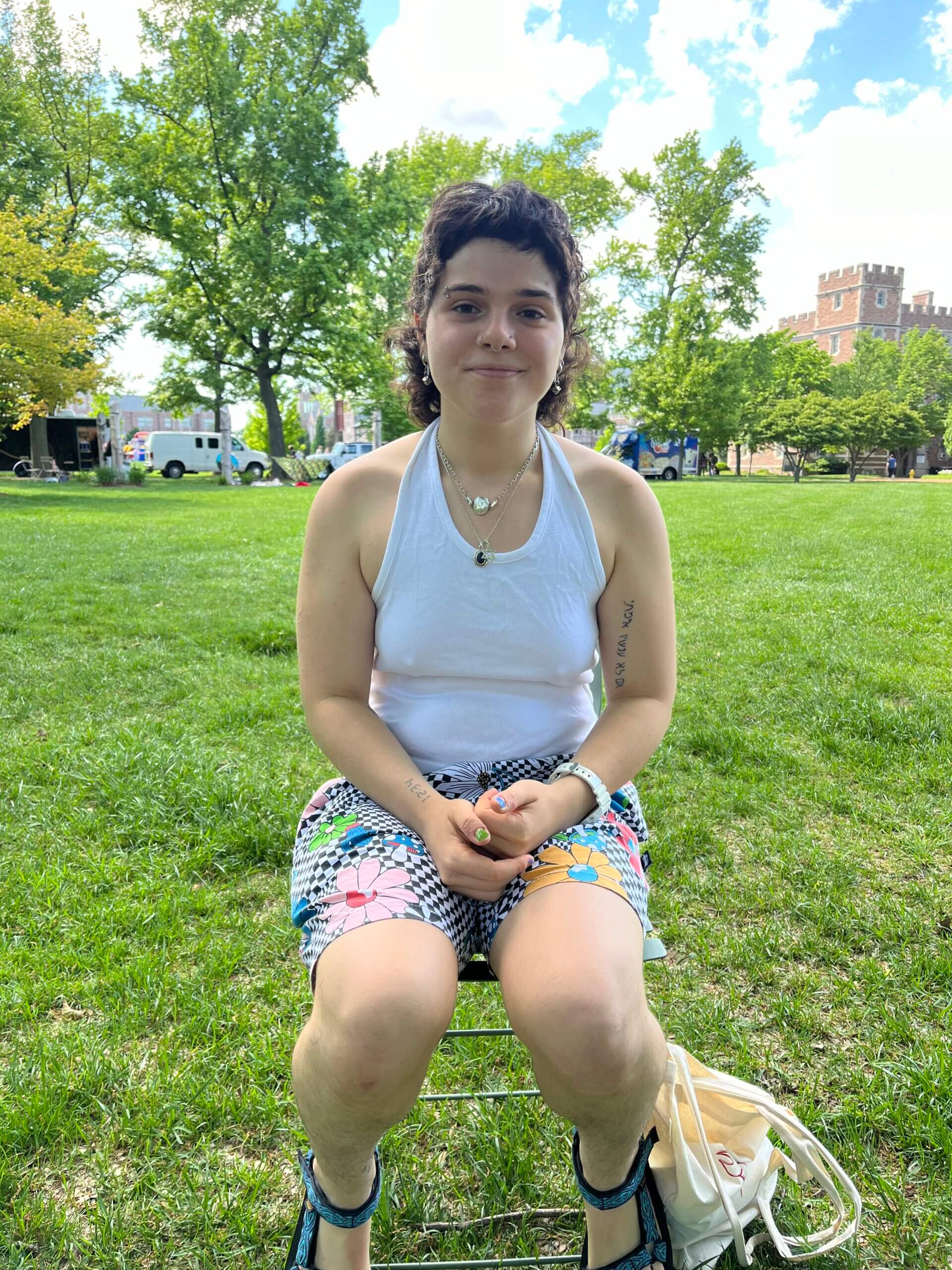
She grew up in the Chicago suburbs with an Israeli father, and they visited the country often. She knew people killed and kidnapped on Oct. 7. She has a quote of the Jewish sage Hillel the Elder tattooed in Hebrew on her bicep that reads, “If not now when.”
Like Platt, she came to Washington University looking to branch out. “After I graduated high school, I had come out as gay,” she said. “I was really looking for more queer friendships in my life because that was never something I had.”
She was never a core Hillel participant. Her activities revolved more around queer circles, and supporting immigrant and refugee rights. Over time, she became more critical of Israel and the occupation. “I learned about the Nakba more in depth,” she said. “I met Palestinians.”
In the fall, she started attending pro-Palestinian protests. Still, Steinbach, a 21-year-old Spanish and international affairs major, led a Torah service at Hillel in late October. But then she stopped attending. “Hillel and Chabad began explicitly assuming that all Jews are Zionists, and that to be anti-Zionist is to be antisemitic,” she said.
In March, she co-founded the Wash U. chapter of Jewish Students for Palestine, which has hosted Shabbat services and a Passover Seder.
Listening to each other
“I don’t necessarily see you as the other side,” is the first thing Steinbach said to Platt when the three of us sat near the lawn where a pro-Palestinian encampment had arisen four days earlier. “I feel like we want the same things.”
She reminded Platt that in their sophomore year they had both gone to meetings of J Street, the Zionist group that describes itself as “the political home of pro-Israel, pro-peace, pro-democracy Americans.”
Steinbach started doubting she was a Zionist after meeting with a Palestinian peace activist and a Jewish left-wing activist in the West Bank on a senior-year high school trip to Israel. Platt had wondered if she is a Zionist because it was what she had always been taught or if she truly believed it. But today, she puts herself firmly in the Zionist camp, describing herself as both progressive and Zionist.
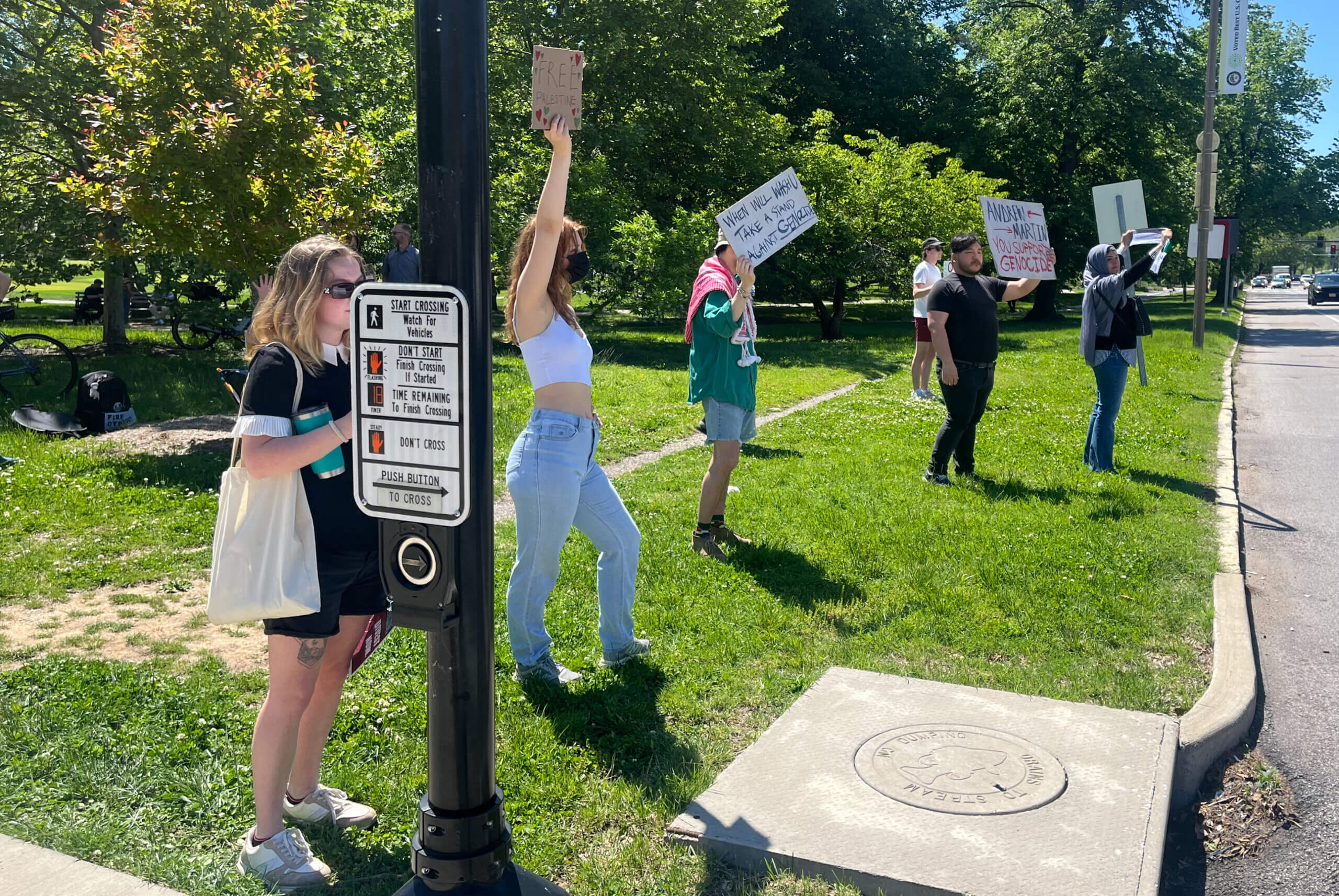
The conversation turned to recent protests and antisemitism on campus.
The encampment, where students called for Wash U. to divest from Boeing, because the company supplies planes and bombs used by Israel in its attack of Gaza, had stood for only four hours before police dismantled it. More than 100 students, faculty, and community members had been arrested. Many were thrown to the ground. A Southern Illinois University professor was hospitalized with nine broken ribs. On May 8, the student government’s nonbinding Boeing divestment referendum won a majority of the votes, but failed to reach the two-thirds majority needed to pass.
From our table by the lawn, we saw no trace of the encampment. The freshly mowed grass looked like a Major League outfield with its perfect striping, and the university had painted over pro-Palestinian and pro-Israel murals in a nearby underpass.
Students were studying on the grass for finals while others gathered around an older man who led a goat on a leash. “Jesus is the G.O.A.T.,” he preached. The university had prohibited press from campus after the protests, but apparently had decided that neither the preacher nor the goat posed a threat.
Both Platt and Steinbach had said they were surprised by the university’s unequivocal move to remove the encampment, and compared it to a 2019 encampment for a campus minimum wage that was not removed by force. In addition to the arrests, the school indefinitely suspended 23 students and placed four professors on leave.
Steinbach didn’t participate in the encampment, but was an ally of those who did. Platt said she feared for her safety during the protest, but also did not feel good about the university’s response.
The previous day, when I met with her and others at Hillel, she pushed back when Hillel’s Rabbi Jordan Gerson applauded the university’s intervention. She interrupted him, rejecting the idea that “that pro-Palestinian students’ safety will come at the expense of Jewish students or that Jewish students’ safety has to come at the expense of pro-Palestinian students.”
It bothered her, she later told me, that some Hillel students seemed to take joy in the aggressive police response. She knew some of those arrested students. “Maybe in a different life,” she said, “that would have been me.”
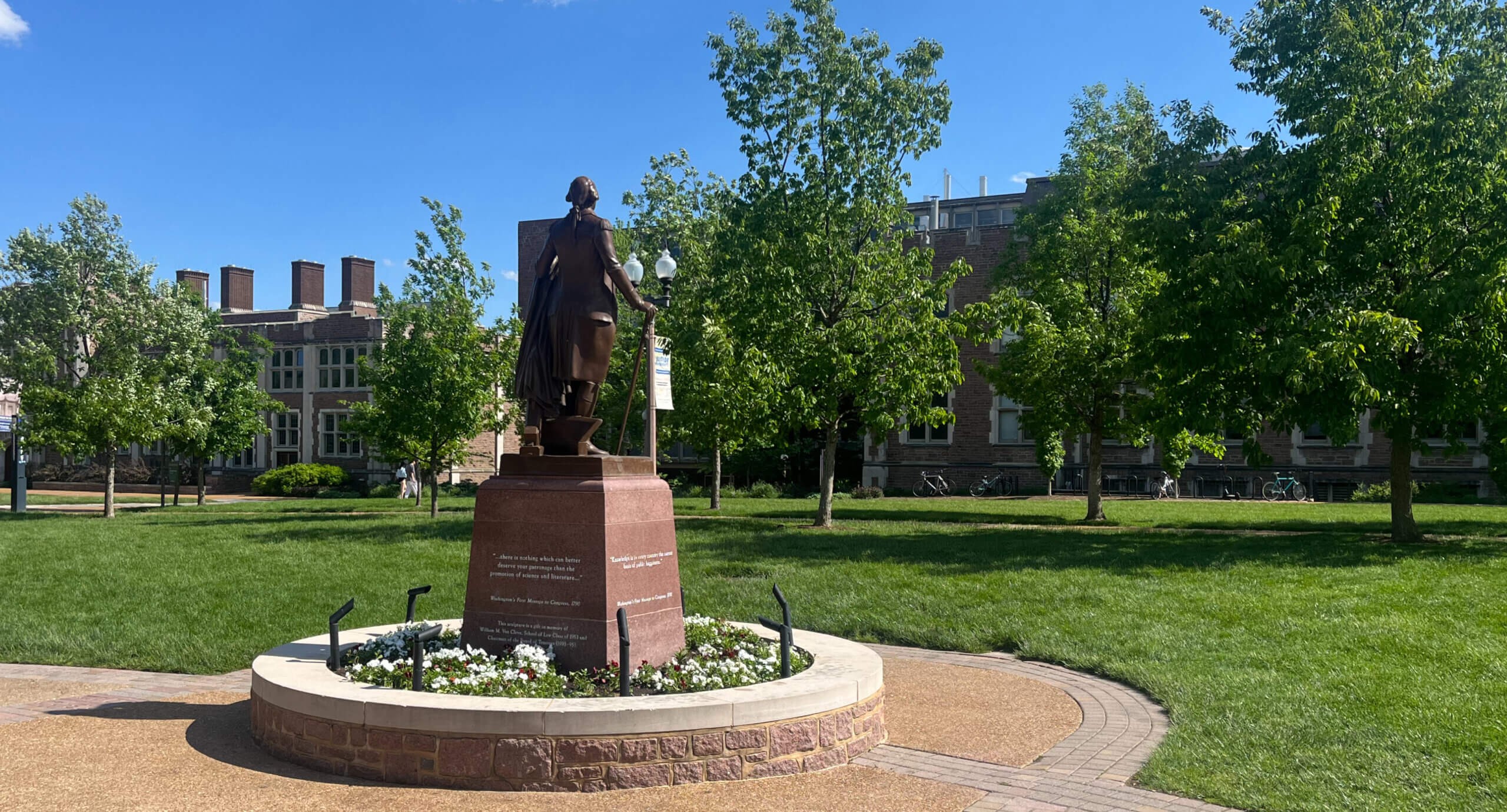
Steinbach understood how Jewish students might fear the encampment. At one point in her life, she said, she would have, too. What she’d learned growing up — “that calls to ‘Free Palestine’ are effectively a call to end the Jewish people,” as she put it — is “hard to unlearn.” She thought it was unfair for protesters to ignore those fears.
“If people are saying things like, ‘I feel scared, I feel unsafe,’” Steinbach told Platt. “You can’t be like, ‘That’s not true.’”
Steinbach, though, said she herself had never felt unwelcome as a Jew at a protest or in any campus groups. But she also said she disliked Holocaust comparisons by activists and rhetoric that vilified Israelis, just as she recoiled when she heard students call for the “flattening of Gaza.”
It was this sort of rhetoric, in addition to Hillel and Chabad’s exclusion of non-Zionists, that prompted her to found Jewish Students for Palestine, she said, and align with campus pro-Palestinian activists, even if she wasn’t in agreement with all their messaging and tactics.
“But I don’t think that the organizing for Gaza has to come at the expense of conversations about campus antisemitism,” Steinbach added.
Antisemitism, anti-Zionism
Platt said she saw a stark double standard on campus for antisemitism compared to other bigotries.
“When people were telling me, my close friends included, that things were racist or Islamophobic, I would take that to heart, I would take things off my Instagram,” she said. “But it would never, ever go the same way when I said something was antisemitic.”
When Platt said she had to leave social justice groups because participation was contingent on her repudiation of Zionism, Steinbach told Platt she was sympathetic, and could relate.
At the end of October Steinbach had given a dvar torah, a short talk, during Saturday morning services at Hillel. “l was very intentional about not talking about what had happened [in Israel and Gaza],” she said. But she disengaged when Hillel and Chabad purported to speak for the entire Jewish community in statements about Israel and the war. She eventually emailed Rabbi Gerson about what she saw as an erasure of non-Zionist and anti-Zionist Jews.
“I know that Hillel is a fundamentally Zionist space,” Steinbach said she wrote to Rabbi Gerson in early March. But she still asked him “to acknowledge that there are Jewish members of the community who want a space to practice their religion that doesn’t necessarily revolve around the state of Israel.” When the rabbi didn’t respond, Steinbach decided to start Jewish Students for Palestine.
Both Hillel and Chabad said that all Jewish students are welcome. The Jewish Student for Palestine’s Seder used supplies from Hillel’s “Jew It Yourself” program and shmurah matzo from Chabad. Gerson told me that he agrees that Hillel has a responsibility to help students explore their Jewish identities. But he’s concerned about Jewish students aligning with movements that seem anti-Jewish and “giving cover” to them.
“I’m hoping that they’ll see through some of this antisemitism,” he said.
Platt agreed that Hillel was not a welcoming space for non-Zionists like Steinbach, even though she found space within Hillel to criticize Israel.
The two seniors listened carefully to each other, but with two weeks left of college, didn’t look to change each other’s minds, or try to fix what had gone wrong on campus. Platt will soon start at a social service organization on the East Coast. Steinbach plans to return to Wash U. after a year working in a immigration law firm in Chicago.
Both, having missed their high school graduations in 2020 due to pandemic lockdowns, feared their college graduation on Monday would be canceled, as it has been at other colleges.
And they worried for first year and incoming Jewish students who won’t have the same freedom to explore the friendlier campus they had both known when they came to Wash U. Platt said first-year Hillel students wondered if they’d ever make non-Jewish friends. She worried that an incoming gay Zionist student would not feel accepted in queer spaces.
“It’s sad,” she said. “It’s just really devastating.”
